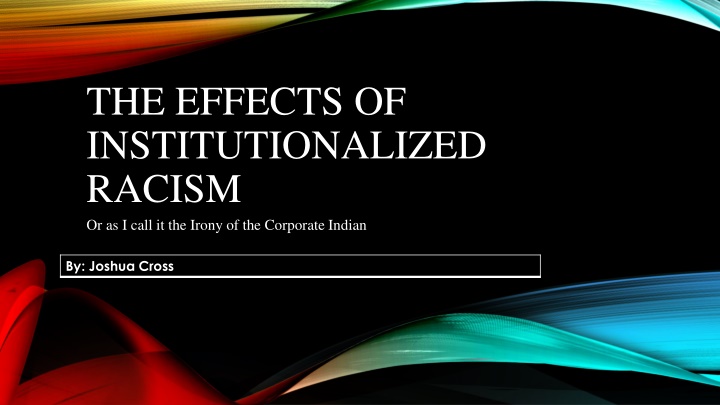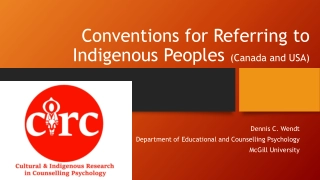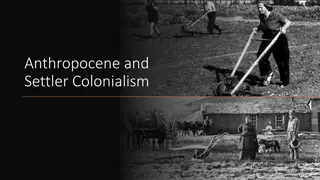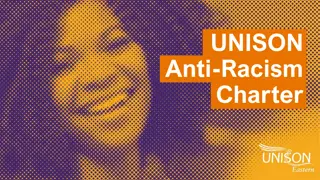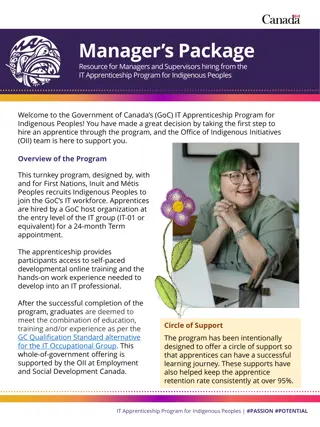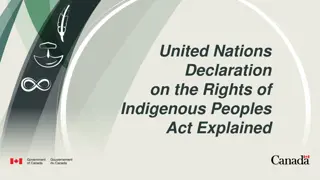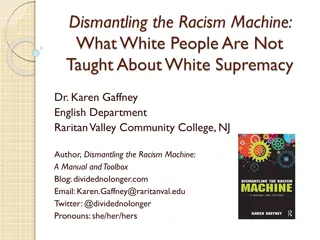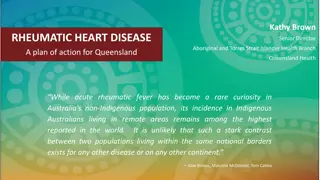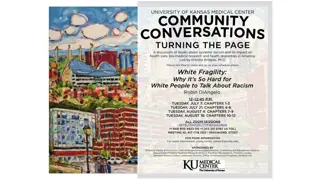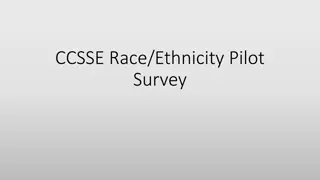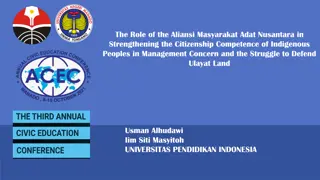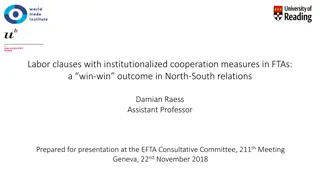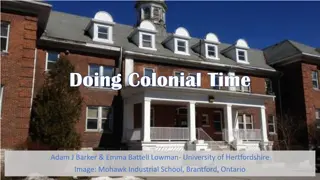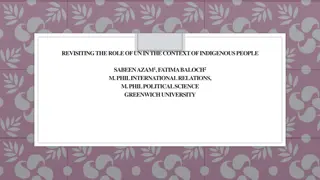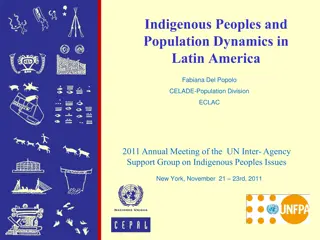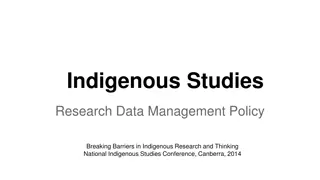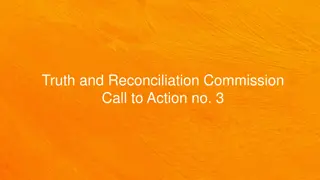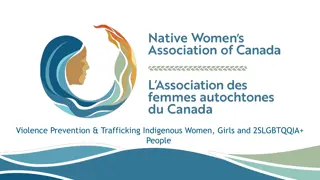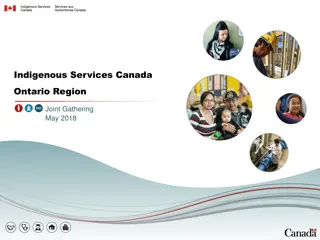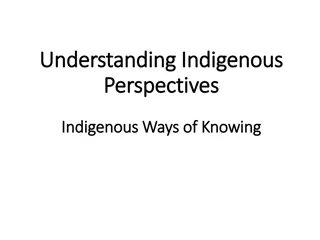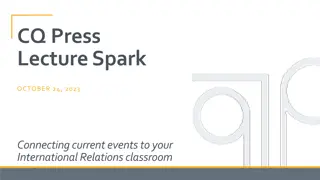Unveiling the Effects of Institutionalized Racism on Indigenous Peoples
Delve into the intricate web of institutionalized racism faced by Indigenous communities, exploring key concepts like covert racism versus operant racism, decolonization, and settler benefits. Learn how historical injustices, such as the Indian Act, continue to impact Indigenous autonomy and the fight against colonial structures in Canada. Quotes from sources shed light on ongoing challenges and the urgent need for recognition and change.
Download Presentation

Please find below an Image/Link to download the presentation.
The content on the website is provided AS IS for your information and personal use only. It may not be sold, licensed, or shared on other websites without obtaining consent from the author.If you encounter any issues during the download, it is possible that the publisher has removed the file from their server.
You are allowed to download the files provided on this website for personal or commercial use, subject to the condition that they are used lawfully. All files are the property of their respective owners.
The content on the website is provided AS IS for your information and personal use only. It may not be sold, licensed, or shared on other websites without obtaining consent from the author.
E N D
Presentation Transcript
THE EFFECTS OF INSTITUTIONALIZED RACISM Or as I call it the Irony of the Corporate Indian By: Joshua Cross
COVERT RACISM VERSUS OPERANT RACISM 2 of my Key Terms: Some racism is disguised or subtle or ingrained/institutionalized such as covert racism. However, other types of racism are more blatant and obvious which is known as Operant Racism Institutionalized Racism is a type of racism ingrained within structures/foundations of society such as Laws, policies or Acts. I.e. Indian Act
MY ARTICLES MAIN POINTS 3. Autonomy: Self-government of one s land or territory and decided what laws, bi-laws, etc. are apart of that land. The multi-Cultural model is highly vulnerable to co-operation by Canadian Governments. This vulnerability is in large part due to the fact that multi-cultural citizenship is exclusively framed as a cultural issue that excludes any in depth discussion of the political relationships and processes required for meaningful Indigenous autonomy. (Fiona, Macdonald.) The main points of my articles focus on decolonization, settler/colonizer s benefitting the most from institutionalized laws of the Government. Allowing aboriginals autonomy over themselves and issues with multi-culturalism. Key Terms: 3. Decolonization: Is the unravelling of the effects of colonialism: where a nation creates and maintains it s superiority over one or more territories. Settler/colonizer s benefitting from institutionalized refers to white privilege and how their values are greater than another s and the way their laws benefit white people and not other people of colour.
QUOTES FROM MY SOURCES: Though Canada has shown some acknowledgement of our colonial past and its painful consequences for Indigenous peoples, colonialism continues as evidenced by pressures on Indigenous nations land base, racism, violence, discrimination by social services, political disempowerment and policies aimed at assimilation. (Zartman, Julie.) Settler colonialism is expressed through the continuation of social, economic and political structures of invasion such as our notions of private property that, bolstered by racism, ultimately lead to laws that justify Indigenous loss of land . (Zartman, Julie.) Indigenous people are not immigrants amongst immigrants nor citizen plus nor minorities among a majority. (Fiona, Macdonald.)
QUOTES CONTINUED The federal Indian Act, first adopted in 1876, like earlier pre-confederation legislation, defined who was and was not an Indian under Canadian Law. The act also defined a process through which a person could lose status as an Indian. (James, Lorimer.) Some lost status when they earned a university degree, joined the armed forces or the priesthood, gained fee-simple title of land, or married a non-Indian (this one applied only to women). (Chelsea, Vowel.) When the first Europeans explorers arrived, the geographically varied land space was already home to several distinct cultural regions among aboriginal peoples. There were hundreds of tribes, languages, and dialects. Complex relationships existed among tribes, involving trade, cooperation, and/or conflict. With colonization, those nations were denied recognition; instead though settlement by France and Britain and subsequent immigration from those nations and many others, the nation of Canada was eventually created. (Diane G. Symbaluk, Tami M, Bereska.)
HTTPS://WWW.YOUTUBE.COM/WATCH?V=GLKURC XDU5A Wab Kinew is a journalist and activist. He has worked with CBC and currently is a newly elected leader of the Manitoba NDP party.
RURAL/RESERVE VS CITY Rural/Reserve natives or natives that reside to reservations tend to look down on city natives as they believe city natives are being disrespectful to the cultural roots of indigenous history. They believe city natives lack spirituality or that city natives are arrogant or offensive as they have conformed to white society which leads to ideas of being greater than or more superior to the traditional ways. City natives/The Corporate Indian. Believe that changes should happen not only in policies of government but also with traditional natives values. i.e. native rap music, Native dubstep for pow wow s or round dances/Incorporating modern values. They don t see themselves as superior but moving forward and believe rural natives are stuck in a victim mentality and are stuck in the past.
INTERNALIZED/INTERRACIAL RACISM Internalized Racism/Interracial racism: A term that refers to hate, anger, resentment, or jealous sentiments and racist attitudes towards one s own culture. Totem Pole Effect: A complex system resulting from colonialism, patriarchy and power gaps within one s own nation, land or territory. Where power or funds are not divided equally amongst individuals. (Refers more to a indigenous way of looking at the term linear model. ) This explains why certain members of bands based on family names are giving more benefits than those native s whose last name that aren t apart of that particular family group.
THE EFFECT THIS HAD ON MY FAMILY AND MYSELF So, to fully understand. I ll start off by talking about my grandpa. My grandpa is native but does not have status as his grandmother married a white French man. Which in turn made her lose her status. My grandma on the other hand had status and was a survivor of residential schools. I put survivor in quotations because no one is truly a survivor of residential schools but I ll incorporate that in later. When my dad was born my grandpa was in jail at the time so he took on his mom s last name Cross. So, that s why me and my dad have status. However, some of my dad s sisters and brothers do not have status as their last names are Marty which was my Grandpa s last name. Which in turn as you can imagine caused and is still causing tension today. My dad then married my mom who was white but I still was able to be deemed Native Enough to get recognized by my band Frog Lake. My dad s sister on the other hand who also had the last name Cross married a white man yet my cousin does not have status. Same sibling last name with the same parents yet I have status and my cousin does not. I believe this is the effect of colonialization as in white society men are deemed dominant or more superior than women which conflicted with traditional native views that women carried all the knowledge and had more predominant power roles. So, now based on gender can result in someone being deemed status, non-status or metis.
THE EFFECT THIS HAD ON MY FAMILY AND MYSELF CONTINUED So, reserves have chiefs and other council members that are voted in by band members. However, an effect I deem the Totem Pole effect that I described previously takes place. Where the families in power make sure their families get funding for schools or getting to have their houses build on the reserve right away. Those who do not have the same last name as those in power get diddly squat. They or for example my auntie have to wait sometimes up to ten years to get permission to build their house on the reserve. Another draw back is when it comes to getting funding for school like me and my dad tried to get became practically impossible. Lucky my dad got his but only because my mom gave her last name instead of his so he could get funding. This why when people say natives get everything for free it really aggravates me because it s not true at all. Because of colonization, genocide, residential schools, and institutionalized racism not only have a lot of indigenous people lost their culture or language but they have become the very thing they hate The White Man/The oppressor.
NO ONE IS TRULY A SURVIVOR What I mean by this is simply that because of colonialism, genocide, and residential schools. A lot of so called survivors of residential schools usually commit suicide, overdose on drugs, deal with PTSD and other mental issues and they also usually end up having drinking problems. Also, many might be seem alive outwardly but be dead on the inside. As dealing with all the abuses they experienced in residential schools and so on has led them to becoming numb to their and other s emotions. Sadly my Kokum was apart of these negative vices and when she and my Mushim were on one of their drinking benders she was hit by a car and subsequently passed away when my father was just ten years old which still negatively effects him to this day.
THE DIVIDE As Abraham Lincoln once said, A house divided cannot stand. So, too can t the indigenous community stand together because colonialism divided them into different subsections. I.e. Status, non-status, Metis, registered, non registered, Bill C-31and Inuit. Thus, leading to interracial racism and a unequal power balance amongst indigenous communities. This also carried with stereotypes, misconceptions and misrepresentation by laws, policies, and media leaves Indigenous communities with a sense of isolation, and invisibility. As natives are seen as problems or as being inconvenient. Which is why ignorant sayings of Get over it are tremendously damaging and hurtful as it perpetuates the cycle of ignorance and intolerance.
CALL TO ACTION Education 6. We call upon the Government of Canada to repeal Section 43 of the Criminal Code of Canada. 7. We call upon the federal government to develop with Aboriginal groups a joint strategy to eliminate 2 | Truth and Reconciliation Commission of Canada educational and employment gaps between Aboriginal and non- Aboriginal Canadians. 8. We call upon the federal government to eliminate the discrepancy in federal education funding for First Nations children being educated on reserves and those First Nations children being educated off reserves. 9. We call upon the federal government to prepare and publish annual reports comparing funding for the education of First Nations children on and off reserves, as well as educational and income attainments of Aboriginal peoples in Canada compared with nonaboriginal people. 10. We call on the federal government to draft new Aboriginal education legislation with the full participation and informed consent of Aboriginal peoples. The new legislation would include a commitment to sufficient funding and would incorporate the following principles: i. Providing sufficient funding to close identified educational achievement gaps within one generation. ii. Improving education attainment levels and success rates. iii. Developing culturally appropriate curricula. iv. Protecting the right to Aboriginal languages, including the teaching of Aboriginal languages as credit courses. v. Enabling parental and community responsibility, control, and accountability, similar to what parents enjoy in public school systems. vi. Enabling parents to fully participate in the education of their children. vii. Respecting and honouring Treaty relationships. 11. We call upon the federal government to provide adequate funding to end the backlog of First Nations students seeking a post-secondary education. 12. We call upon the federal, provincial, territorial, and Aboriginal governments to develop culturally appropriate early childhood education programs for Aboriginal families. (Truth and Reconciliation Act).
CRAZY BRAIDED BRAIN BY CLASSY J. DISCLAIMER: THERE IS SOME COARSE LANGUAGE IN THIS RAP SONG SO PLEASE BE ADVISED I will be doing a live version of this song. I don t own this beat but it works with what I m saying. https://www.youtube.com/watch?v=XcAVGux4Ycs&index=74&list=LLqcZDzq Kwhpbn8B8GFPyTRA&t=0s Inspiration for writing this song comes from my life and my families lives. It was also inspired by the rappers Earl Sweatshirt and Denzel Curry.
EXPLAINING THE LYRICS: Verse 1: Sentenced to the hygienist, because I got that Indian virus. Wish I was more like Leonidas, for my warrior self was vanquished. Got a sense of anguish, as I don t even know my own people s Language. Why did I get banished from my own land, and these immigrants now hold thee advantage? Feels like they on a witch hunt, ain t life a bitch huh? Can t even make a quick buck, because I m seen as a stupid fuck. Feel like a sitting duck with the sniper locked, damn is this the feeling of a cuck? Stories always end up sad but Afterall I m just the bastard of the brady bunch! Brown skin cursed kin and a desperate sin so I gotta eat outta garbage s for lunch. Trying not to use victimization as a crutch, but it s like I m a kid who got tricked into a game of double Dutch. Crazy braided brain, deranged rabid rabbit spewing train going down a road of pain. Come on yawl don t you want to see the freak from cirque de soleil? Trying in vain to wash away my shame, but the colour of my skin just won t go away, oh what a shame! So, I m left crying and thinking about dying, hoping to be anything that may stray away from my family name. For I ve realized that I m stigmatized by these whitened eyes: that be educating lies of me being the one to blame!
EXPLAINING LYRICS CONTINUED Hook: No more will I be ok with this forced recital! No more will I sit idle! No more patriarchy, and fuck the curse of ham nonsense used to justify you being spiteful! Fuck your racist sentiments man, my colour doesn t make me homicidal. Verse2 Brown clown, Down syndrome gnome! Torn men, torn women left in prison zones! Burn them, kill them, rape them right in they home! Don t frown, don t make a sound, just stay on the ground. Hands behind heads, then shot with lead, like a dog from the pound! Lost and never found, but this just the curse of being brown! What s this now? Nothing but wards of the crown. Just a bitch, just a glitch, that live in some crack towns! Or reserves doesn t matter what the word Or what the place is when one puts on war paint on top of their savage faces. Here s the thing Bitch, I m not scared of staring ya down #okacrisis! For as see it colonists are no different than isis. I know we deal with vices, But it s just the effects of dealing with your hepatitis! And I just might be bias, But at least I m not a delusional racist! It doesn t matter if it s Past, present or future violence, I think it s about time to end the silence!
REFERENCES: Wab Kinew. Soap Box. Canadian Broadcasting Corporation. (2015). https://commonword.ca. Abraham Lincoln. A House Divided Speech. Spring field, Illinois. June. 16th, 1858. http://www.abrahamlincolnonline.org/lincoln/speeches/house.htm Zartman, Julie. Settler: Identity and colonialism in the 21stcentury Canada. The Canadian Journal of Native studies. (2016). Vol.36, Issue.1. pp. 241-244. Canadian Business and Current Affairs Database. ISSN: 07153244. DOI: https://search.proquest.com/docview/1826237379?accountid=12368
REFERENCES CONTD Fiona, Macdonald. Democratic Multi-culturalism: A political approach Constellations: An International Journal of Critical and Democratic Theory. (2014) Vol. 21, Issue:4. ISSN: 1351-0487. DOI: 10.1111/1467-8675.12095. James, Lorimer. The Final Report of the Truth and Reconciliation Commission of Canada. (2015). Vol 1. ISSN: 978145941067. Truth and Reconciliation Act. Call to Action. Commission of Canada. Winnipeg, Manitoba. (2012). http://www.trc.ca/websites/trcinstitution/File/2015/Findings/Calls_to_Action_English2.pdf
REFERENCES CONTD Diane G. Symbaluk, & Tami M. Bereska. Sociology In Action: A Canadian Perspective. Nelson Education. Second Edition. MacEwan University. 2016. Chelsea, Vowel. Indigenous Writes: a guide to First Nations, Metis, and Inuit issues in Canada. Highwater Press. Canada Council for the Arts. 2016. James, Lorimer & Company. Final Report of the Truth and Reconciliation Commission of Canada. Library and Archives Canada Cataloguing. Commission of Canada. Volume one: Summary. 2015.
